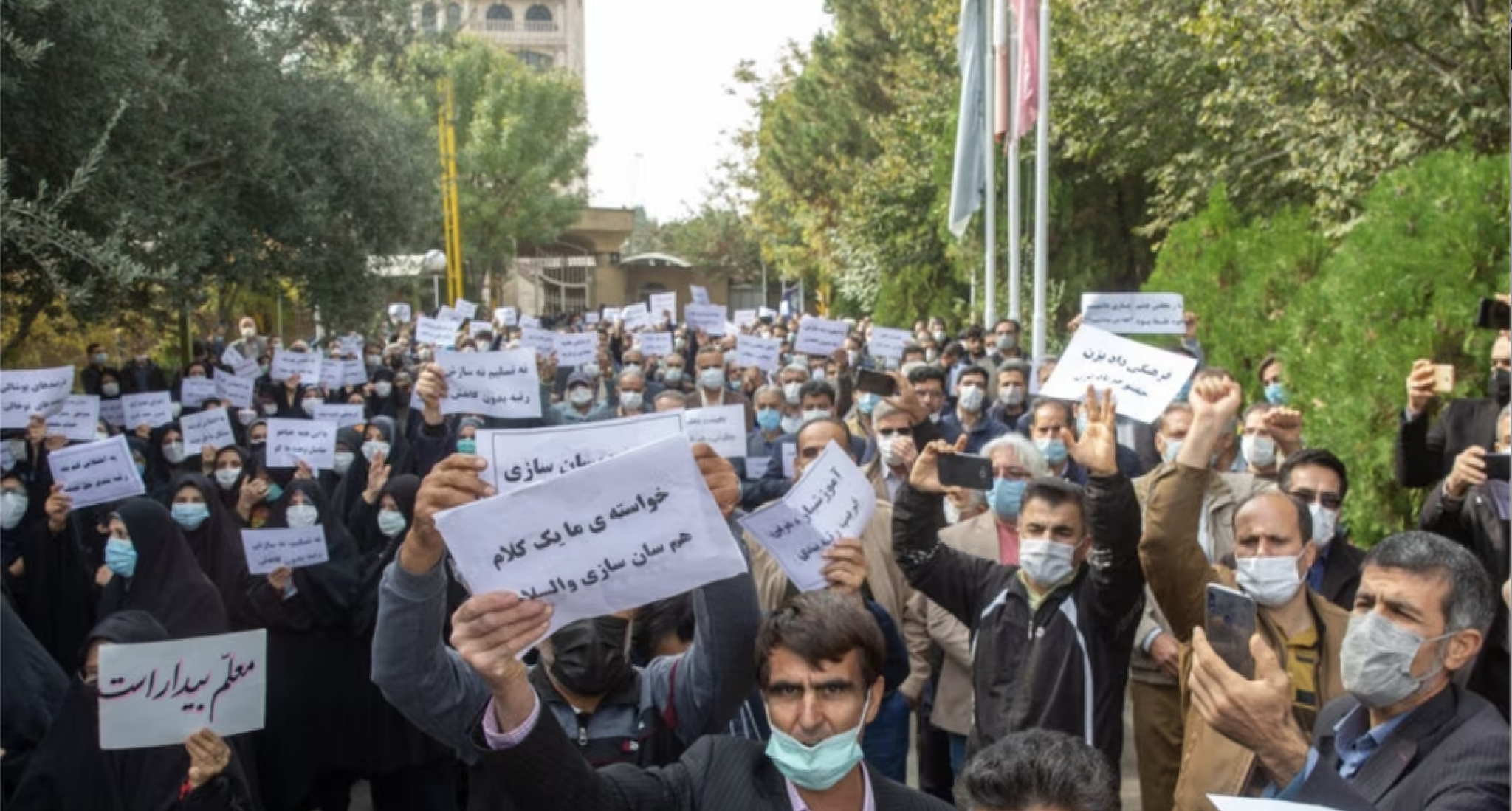برای خواندن این مطلب به فارسی اینجا را کلیک کنید
In the late summer and early autumn of 2021, a series of teacher gatherings took place in Iran, calling attention to the challenges Iranian educators face. The teachers demanded the implementation of teachers’ rating plans and equalization of retiree salaries according to the Civil Service Management Law. The Ministry of Education’s lackluster efforts and insufficient funding to enforce this law has resulted in widespread discontent among teachers, motivating the organization of protests.
Rather than heed their demands, Iranian authorities have instead cracked down. Many teachers who participated in the nationwide Teacher’s Day 2022 demonstrations have been arrested, and they are still awaiting court hearings. In the past few months alone, over 200 teachers have been arrested and summoned on baseless and false charges, including threatening national security. These arrests have been accompanied by lengthy interrogations, insults, and threats to their rights of association, organization, and expression.
A group of teachers in Fars province recently received harsh and collective sentences for their participation in protests, highlighting the high costs that inevitably arise when seeking justice in Iran Asghar Amirzadegan, Abdul Razzagh Amiri, Zahra Esfandiari, Mozhgan Bagheri, Afshin Razmjoui, Iraj Rahnama, Mohammad Ali Zahamtakesh, and Gholamreza Gholami Kandazi were sentenced to a total of 34 years in prison by the trial court. According to a judge in the case, the teachers’ protests were labeled “gathering and collusion against the regime.” However, this is a flagrant violation of Article 27 of the Iranian Constitution which guarantees citizens the right to participate in peaceful trade union activities.
In Gilan province, Anosh Adeli, Aziz Ghasemzadeh, and Mahmoud Sedighipour have also been summoned and charged with propagating against the regime, according to the Coordinating Council of Educators’ Trade Unions. Concerns have been raised regarding the safety of these arrested teachers due to a lack of information regarding their current condition, and they have been denied access to their families during their incarceration. Adeli, Ghasemzadeh, and Sedighipour have been detained in Rasht’s Lakan prison since April 9.
These alarming incidents highlight a clear pattern of security forces and judicial authorities targeting union activists within the teaching profession.
Additionally, Ateke Rajabi, a member of the Iranian teachers’ trade union center and known social justice advocate, was arrested in May as a result of increasing government pressure on the ongoing protests for teachers’ rights. In response to a request issued by the Coordinating Council of Iranian Educators’ Trade Union Organizations, a nationwide gathering of teachers took place simultaneously. Farzad Safi Khanpour, who was unlawfully arrested during a teachers’ rally in Sanandaj, has also declared a hunger strike to protest his unlawful arrest.
Apart from the summonses and arrests, protesting teachers have also been subjected to a variety of punitive measures, including forced retirement, rejection of ratings, group reductions, salary cuts, and redemption requirements. This includes Abolfazl Rahimi Shad, who was abruptly terminated from his teaching position after serving 24 years and 8 months following participation in teacher protests.
Notably, a teacher and artist from Lordegan – Mohammad Saeedi Abu Eshaghi – was also terminated for his advocacy. The Chaharmahal and Bakhtiari province Administrative Offenses Board has been notified of the accusations against Abu Eshaghi, which involved supporting the families of those killed in protests and attending burial ceremonies. He was also accused of mythologizing the deceased and aligning himself with hostile groups for expressing his emotions and art in a virtual environment.
Teachers from all over the country have been targeted, regardless of their location. In Ahvaz, the court addressed accusations against 11 teachers’ union activists, including Pirouz Nami, Kokab Badaghi, Siamak Sadeghi Chehrazi, Ali Korushati, Eghbal Tamradi, Sadegh Naseri, Zohreh Bakhtiari, Shahriar Shirvania, Moin Zargani, Behnia Bahmani-nejad, and Emad Rafii. Farzaneh Zilabi, their lawyer, shared that the charges against them included propaganda against the regime and membership in groups that disrupted security.
In Yazd, similar incidents have occurred involving teachers’ union activists, including Hamideh Zare Cheshmeh, Ahmad Changizi, Mansour Mirzaei, Mohammad Fakhrul-Hosseini, and Mehdi Kalantari. Their cases remain unclear after being summoned to the Revolutionary Court of Yazd.
Mahmoud Malaki, a member of the Bushehr teachers’ union, was arrested while trying to retrieve his confiscated personal items. Previously, Kokab Badaghi Pegah, a trade union activist and physical education secretary in Izeh city, was detained and released, but an investigation committee found administrative violations against him.
Currently, teachers have not been afforded their right to protest against unfavorable working conditions, salary issues, or even concerns about the education and well-being of their students. It is impossible to sustain an effective education system without addressing these basic concerns.
In a particularly disturbing incident, a teacher imprisoned in Shiraz’s Adel Abad prison was attacked by individuals allegedly connected to the Shahcheragh terrorist case. As reported by the Coordinating Council of Cultural Organizations, Mehdi Fathi was sharing a cell with four ISIS prisoners when he was assaulted by them. The prison transferred Mr. Fathi to another ward after he sustained severe injuries, including a broken nose, neck, and spine. A number of political prisoners, including Mehdi Fathi, have been threatened and harassed by the four defendants in the Shahcheragh case, who repeatedly assert that their attacks were “lawful” under Sharia. Prison authorities are alleged to have harassed Mehdi Fathi for refusing to submit a “repentance letter,” and putting him in the same cell as the ISIS prisoners appears to have been part of a disturbing effort to break his will.
A number of cultural rights activists, including Esmail Abdi, Hashem Khastar, Rasoul Bodaghi, Jafar Ebrahimi, and Mehdi Fathi, have been detained for extended periods of time as a result of these unjust actions. Eskander Lotfi, Shaban Mohammadi, and Masoud Nikkhah, three activists of the teachers’ union, were unlawfully imprisoned in August 2022. After months in solitary confinement, bail amounts have been set for their release. However, they are still awaiting court proceedings. In protest of the oppressive and unlawful treatment provided by security forces during their detention, Lotfi began a hunger strike which he continued until his colleagues pleaded with him to end it as a result of his severe health decline. The families of labor activists have openly condemned the ongoing illegal imprisonments and the deplorable conditions their loved ones endure.
It is deeply concerning that Iranian teachers are subjected to severe pressure, harassment, and violations of their rights. Teachers play an important role in determining a nation’s future as well as the quality of its education system. The National Iranian American Council (NIAC) strongly condemns these violations and advocates for the protection of teachers’ rights and freedoms, including the right to organize. Teacher rights must be respected and allowed to be exercised so that they can perform their important role in building a better future for the nation. This issue is extremely important for Iran, since it directly impacts the quality of education and the future of the nation.
Back to top
